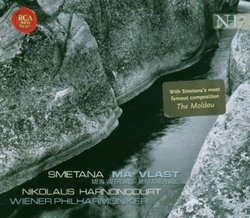| All Artists: Bedrich Smetana, Nikolaus Harnoncourt, Vienna Philharmonic Orchestra Title: Smetana: M� Vlast Members Wishing: 0 Total Copies: 0 Label: Sony Classics Original Release Date: 1/1/2003 Re-Release Date: 10/21/2003 Genre: Classical Styles: Forms & Genres, Theatrical, Incidental & Program Music, Symphonies Number of Discs: 1 SwapaCD Credits: 1 UPC: 828765433129 |
Search - Bedrich Smetana, Nikolaus Harnoncourt, Vienna Philharmonic Orchestra :: Smetana: M� Vlast
 | Bedrich Smetana, Nikolaus Harnoncourt, Vienna Philharmonic Orchestra Smetana: M� Vlast Genre: Classical
|
Larger Image |
CD Details |
CD ReviewsFor once, Harnoncourt loses his Czech touch Louis Lee | Princeton, NJ United States | 01/13/2004 (2 out of 5 stars) "Those who are familiar with Harnoncourt's stunningly simple yet powerful Dvorak recordings will be deeply disappointed here. In the Dvorak triptych, Harnoncourt masterfully outlines the big tunes with plain tone colour, adopting fairly conventional tempi and resulting in extremely coherent performances. Not so here. His languid tempi (you will not be able to find any other recording which needs to spill onto a second disc) so often make each tone poem lose its structural shape, and his harping on individual melodies make things sound rather fragmentary. It is worth hearing for its entertainment and intellectual value, and it challenges your perception and conception of the piece, but not very convincingly to my ears." A Ma Vlast like none else Marc Haegeman | Gent, Belgium | 11/30/2003 (4 out of 5 stars) "There are many recordings of Smetana's most famous work, yet this is a "Ma Vlast" like none else. Nikolaus Harnoncourt conducting the Wiener Philharmoniker surprises us once again with a reading of Smetana's grandiose cycle which fascinates, amazes and irritates at the same time. With very slow, dreamy tempi (the cycle runs for two CDs), painstaking care for orchestral detail and colour, emphatic, incisive chords often at the expense of the melodic flow ("Moldau", "Sarka"), and with unyielding seriousness, Harnoncourt revisits the score and the result is in places revelatory, but fails to convince as a whole. The general atmosphere is one of gentle melancholy ("Vysehrad") and there are moments when Harnoncourt superbly brings out the beauty of the music ("From Bohemia's Fields and Groves"), yet in the more dramatic passages as a listener I hardly ever felt concerned by what was going on. Harnoncourt's vision is far too intellectual and rigorous, lacking that bit of dionysian touch which makes Smetana's score such a thrilling listening experience.As usual with Harnoncourt, "Ma Vlast" was recorded during concerts in Vienna in 2001, although the slight difference in atmosphere between the various poems is about the only audible hint that these are indeed live recordings. The Wiener Philharmoniker brass (magnificent it may be) is balanced forwardly, in tutti often in spite of the strings, but the recording is clear and dynamic, and generally honours Harnoncourt's surgical care for instrumental detail.Because of its extreme positions this recording can not be a first choice, but for all admirers of Smetana's magnificent work this CD set is required listening. Excellent liner notes by Harnoncourt himself (in German, English, French)." Harnoncourt's Intriguing Version Of Ma Vlast John Kwok | New York, NY USA | 12/16/2003 (4 out of 5 stars) "Nikolaus Harnoncourt offers an intriguing, riveting, and occasionally inspiring, interpretation of Smetana's Ma Vlast which is worth acquiring, even if I can not recommend it as one of the primary interpretations (For these I would look to Kubelik's recordings, or more recently, to Mackerras' splendid interpretation with the Czech Philharmonic.). Harnoncourt's approach is far more intellectual, emphasizing the rich architecture of Smetana's tone poem scores, at the expense of rendering any emotionally riveting interpretation. Yet there are often times when he succeeds beautifully, most notably in the Bohemia Woods piece, in which he emphasizes the beautiful, Romantic aspects of the score. In stark contrast, his interpretation of the Moldau may be the most unique, and quixotic performance I've heard, emphasizing sharp, abrupt changes in tempi. Harnoncourt offers a brief, incisive look at these scores and his interpretations in the liner notes. Along with his recording of the Bruckner 9th Symphony, this is his CD debut on the BMG RCA Ariola classics label, having forsaken his life-time contract with Warner (formerly Teldec) Classics. Despite my reservations with Harnoncourt's interpretations, this is still a splendid debut with this recording label, emphasized by the Vienna Philharmonic's warm, vibrant playing. The sound engineers have provided an extremely well-balanced recording, with perhaps a slight nod to the brass sections. If you are a long-time admirer of Nikolaus Harnoncourt and the Vienna Philharmonic, then you won't be disappointed with this recording. Otherwise, Smetana admirers may be slightly disappointed with Harnoncourt's interpretations, but they should consider acquiring this CD as a fascinating alternative to those from Kubelik and Mackerras."
|

 Track Listings (3) - Disc #1
Track Listings (3) - Disc #1